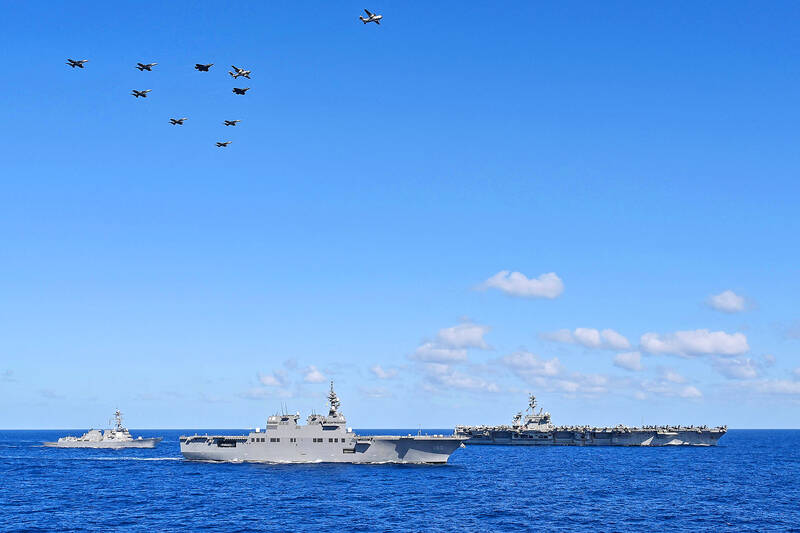Japan and the US are conducting joint military exercises with China as a hypothetical enemy for the first time, Japanese media on Sunday cited Tokyo officials as saying.
The Japan Self-Defense Forces and the US military set a possible Taiwan contingency as the main scenario for their highest-level military exercise Keen Edge, which began on Thursday last week and is scheduled to end on Thursday, Kyodo News reported.
Keen Edge is a biennial command post training drill in which Japanese and US military employ computer simulations to practice responses in the event of a crisis or contingency, the US Indo-Pacific Command said.

Photo: AFP
Japanese General Yoshihide Yoshida, the head of the Japan Self-Defense Forces, told a news conference on Jan. 25 that Japan and the US “did not envision a particular country or region” for the exercise, the Japan Times reported.
However, Kyodo News cited “multiple government officials” as saying that China was the hypothetical enemy.
Compared with past exercises, which used tentative names for hypothetical enemies, the current exercise is conducted under a much more concrete assumption, it said.
The Japanese Ministry of Defense is believed to have classified the scenario as a specially designated secret protected by Japan’s State Secrecy Law, it said.
Amid growing concerns that China would invade Taiwan within the next few years, naming a hypothetical enemy indicated a strong sense of urgency shared by Japan and the US, it said.
In previous exercises, Japan and the US used maps that slightly differed from the topography of actual countries to “avoid a backlash in the event the plans were leaked,” but switched to unaltered maps in the current exercise, the Japan Times reported.
Japan and the US have drawn up several joint operation plans in preparation for possible contingencies, with a draft envisioning a Taiwan contingency being completed at the end of last year, Kyodo News said.
The two sides are said to finalize the drafted plan by the end of this year based on the results of the current exercise, it said.
Troops are expected to carry out the plan during the field training exercise Keen Sword next year to verify its efficacy, it said.

Conflict with Taiwan could leave China with “massive economic disruption, catastrophic military losses, significant social unrest, and devastating sanctions,” a US think tank said in a report released on Monday. The German Marshall Fund released a report titled If China Attacks Taiwan: The Consequences for China of “Minor Conflict” and “Major War” Scenarios. The report details the “massive” economic, military, social and international costs to China in the event of a minor conflict or major war with Taiwan, estimating that the Chinese People’s Liberation Army (PLA) could sustain losses of more than half of its active-duty ground forces, including 100,000 troops. Understanding Chinese

The Ministry of Foreign Affairs (MOFA) yesterday said it is closely monitoring developments in Venezuela, and would continue to cooperate with democratic allies and work together for regional and global security, stability, and prosperity. The remarks came after the US on Saturday launched a series of airstrikes in Venezuela and kidnapped Venezuelan President Nicolas Maduro, who was later flown to New York along with his wife. The pair face US charges related to drug trafficking and alleged cooperation with gangs designated as terrorist organizations. Maduro has denied the allegations. The ministry said that it is closely monitoring the political and economic situation

‘SLICING METHOD’: In the event of a blockade, the China Coast Guard would intercept Taiwanese ships while its navy would seek to deter foreign intervention China’s military drills around Taiwan this week signaled potential strategies to cut the nation off from energy supplies and foreign military assistance, a US think tank report said. The Chinese People’s Liberation Army (PLA) conducted what it called “Justice Mission 2025” exercises from Monday to Tuesday in five maritime zones and airspace around Taiwan, calling them a warning to “Taiwanese independence” forces. In a report released on Wednesday, the Institute for the Study of War said the exercises effectively simulated blocking shipping routes to major port cities, including Kaohsiung, Keelung and Hualien. Taiwan would be highly vulnerable under such a blockade, because it

UNRELENTING: China attempted cyberattacks on Taiwan’s critical infrastructure 2.63 million times per day last year, up from 1.23 million in 2023, the NSB said China’s cyberarmy has long engaged in cyberattacks against Taiwan’s critical infrastructure, employing diverse and evolving tactics, the National Security Bureau (NSB) said yesterday, adding that cyberattacks on critical energy infrastructure last year increased 10-fold compared with the previous year. The NSB yesterday released a report titled Analysis on China’s Cyber Threats to Taiwan’s Critical Infrastructure in 2025, outlining the number of cyberattacks, major tactics and hacker groups. Taiwan’s national intelligence community identified a large number of cybersecurity incidents last year, the bureau said in a statement. China’s cyberarmy last year launched an average of 2.63 million intrusion attempts per day targeting Taiwan’s critical